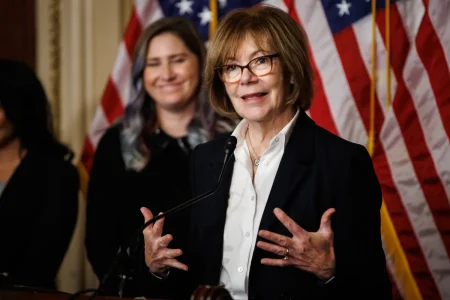Trump-Aligned Think Tank Proposes Major Overhaul of H-1B Visa Program
The Heritage Foundation, a conservative think tank closely associated with Donald Trump’s administration and Project 2025, has called for Congress and the White House to implement sweeping reforms to the H-1B visa program. Their detailed report, first published by the Daily Caller, outlines several dramatic changes that would fundamentally reshape how skilled foreign workers enter and remain in the United States. These recommendations come at a time when the Department of Labor (DOL) has already launched “Project Firewall,” a collaborative effort with the Department of Justice and other federal agencies designed to protect American workers’ employment opportunities. This initiative represents growing concern among conservatives about the impact of foreign labor on American jobs, particularly in technology and research sectors.
Among the most significant changes proposed by the Heritage Foundation are the elimination of exemptions currently afforded to research and nonprofit organizations, replacing the current H-1B lottery system with a wage-based ranking method that would prioritize higher-paid positions, and explicit clarification that spouses of H-1B visa holders (those with H-4 visas) should not be permitted to work in the United States. The report also advocates for strict annual caps on the number of H-1B applications any single company can submit and implementing permanent bans against any entities found violating immigration laws related to the program. Simon Hankinson, a senior research fellow at the Heritage Foundation, emphasized the urgency of these reforms, stating, “It’s past time for Congress to end not only the numerous types of H-1B abuses, but also the administrative state creations that developed the student-to-H-1B-green-card pipeline that adversely affects American students and employees.” This sentiment reflects broader conservative concerns that the current system disadvantages American workers in favor of cheaper foreign labor.
The Trump administration has already begun implementing changes to the H-1B program, most notably introducing a controversial $100,000 fee for new H-1B petitions filed after September 21, 2025. This represents a dramatic increase from the previous fee structure of approximately $2,000–$5,000 per petition. While the fee applies primarily to beneficiaries outside the U.S., the policy does include provisions for national interest exemptions to be granted on a case-by-case basis. Critics, including experts at the Council on Foreign Relations (CFR), have warned that such steep fees could significantly restrict access to highly skilled immigrants and place smaller companies and startups at a severe competitive disadvantage compared to larger corporations that can more easily absorb such costs. The Heritage Foundation’s recommendations would go even further, adding transparency requirements by mandating the Department of Labor to publish monthly statistics on H-1B petitions, related layoffs, complaints filed, and ongoing investigations into potential abuses of the system.
The debate around H-1B visas has created some interesting political alignments. Former Trump supporter Representative Marjorie Taylor Greene of Georgia has gone even further than the Heritage Foundation, suggesting the complete elimination of H-1B visas, claiming, “Big Tech, AI giants, hospitals, and industries across the board have abused the H-1B system to cut out our own people.” Meanwhile, Trump himself has taken a somewhat more nuanced position, particularly regarding industries where American workers may lack necessary skills. Discussing semiconductor manufacturing, Trump noted, “For instance, if you’re going to be making chips — we don’t make chips too much here anymore, but we are going to be in a period of a year, we’re going to have a big portion of the chip market. But we have to train our people how to make chips.” This stance acknowledges the potential need for foreign expertise in developing domestic capabilities, while still emphasizing the eventual transition to American workers.
White House Press Secretary Karoline Leavitt has attempted to clarify the administration’s position, stating, “President Trump does not support American workers being replaced. He has a nuanced, commonsense approach — after those factories are up and running and workers are trained, these companies better be hiring American workers.” This position attempts to balance the acknowledged need for some foreign expertise with the political imperative to protect American jobs. Meanwhile, the Department of Labor’s Project Firewall has already begun enhanced federal enforcement efforts aimed at preventing discrimination against American workers in the H-1B process. The initiative coordinates with the Equal Employment Opportunity Commission and other federal departments to ensure that qualified Americans are fully considered for skilled positions before employers can turn to foreign workers, representing a significant shift in enforcement priorities.
As the debate over H-1B visas continues, the proposals from the Heritage Foundation and the Trump administration’s existing policy changes signal a likely increase in federal scrutiny over skilled foreign labor. Edward Alden, a trade and immigration expert at the Council on Foreign Relations, has noted that “There’s always been a reasonable consensus that highly skilled immigration is good for the United States,” highlighting the tension between traditional economic thinking and the new populist approach to immigration policy. Project Firewall is expected to accelerate investigations and enforcement actions against employers deemed to be failing to prioritize American workers, potentially creating significant compliance challenges for companies that have historically relied on H-1B talent. The outcome of these policy shifts will have profound implications not just for the tech industry, which has been the largest user of H-1B visas, but also for America’s broader position in the global competition for talent and its ability to maintain technological leadership in critical fields.















